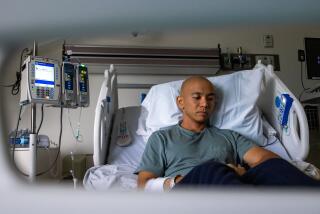Transplant Law Keeps Japanese in Limbo
- Share via
TOKYO — Miki Taira’s dreams of becoming a nurse were shattered when she was diagnosed with leukemia at 19. Years of chemotherapy left her with a critically weakened heart. Now her friends are trying to raise $800,000 to pay for a heart transplant in the United States.
“The situation here is hopeless,” Taira, 37, said by e-mail from her hospital in the western city of Osaka, Japan, where she is being kept alive by a ventricular assist system. She is unable to have visitors.
“When I was accepted as a transplant candidate by an American hospital, it felt like a rope being thrown down from heaven.”
About 80 Japanese are waiting for a new heart. Last year, not one found a donor in this country -- a wrenching situation that is fueling a debate about whether a landmark law intended to make organ transplants easier is working.
Backed by patients’ advocates and some doctors, a group of Japanese lawmakers want to rewrite the 1997 law, which allowed organ donations by people diagnosed as having suffered an irreversible loss of brain activity -- brain death.
Until then, patients in Japan could be declared dead only after their hearts stopped. Kidneys and corneas could be used for transplants, but it was too late for hearts or livers.
At issue now is whether conditions for becoming a donor are too strict.
Unlike the United States and other countries where organ transplants from brain-dead donors are routine, Japan does not permit families to approve them if a potential donor has not expressed such a wish in writing.
Critics of the law say that’s unrealistic.
“Most people never think seriously about the possibility of brain death,” said Taro Kono, a ruling-party lawmaker. “Families make funeral arrangements for their loved ones because they know best what the deceased would have wanted. Organ donations should be the same.”
Since 1997, only 29 Japanese diagnosed as brain dead have become organ donors, though an estimated 3,000 people suffer brain death here each year.
Demand for hearts and other organs has overwhelmed supply.
A total of 171 patients have signed up for heart transplants since the procedure was legalized, the Japan Organ Transplant Network says. But only 20 have found donors here. Fifty-five have died, 75 are still waiting, and 21 have found or are seeking transplants elsewhere.
The most desperate, like Taira, are looking abroad, to such places as the United States, Germany and Canada.
In Japan there’s no shortage of good intentions when it comes to organ donations: More than a third of Japanese say in surveys they would be willing to become donors after brain death. But only about 5% have signed donor cards.
Similarly, 55% of Americans said in a Gallup poll they were willing to donate organs, yet only 28% had put that wish in writing. Still, about 5,000 brain deaths of Americans result in donations each year.
The big difference is that U.S. law allows relatives of Americans ruled brain dead to give permission for organ donation, and about half do so, said Dr. Paul Terasaki, a professor emeritus at UCLA who specializes in tissue typing for transplants.
“Nobody really wants to face death, so the number of people carrying a donor card is small in the U.S. too,” Terasaki said. “I think the number of donors in Japan would be dramatically different if the consent law was changed.”
Some Japanese say the real reason the numbers are low here is simple: Many people aren’t convinced brain death is the end of life.
Eiji Tsunakawa, a member of a coalition of civic and religious groups opposed to changing the law, said that taking the decision out of a patient’s hands would violate the most precious of individual rights.
“It’s partly emotional, partly common sense,” Tsunakawa said. “How can you say that somebody whose heart is beating and body is warm and sweats is really dead?”
Some also worry that doctors might be too quick to give up on patients who could be saved and would pressure families into agreeing to transplants. Japan’s first heart transplant, in 1968, ended in controversy when the doctor was investigated for allegedly removing the organ from a patient who wasn’t dead and transplanting it to another who didn’t need it. He was never indicted, but no heart transplants were allowed until the 1997 law.
Distrust of doctors also reflects patients’ sense of powerlessness in a nation where second opinions are frowned on and winning legal redress for malpractice is difficult.
“In Japan, doctors aren’t supposed to be challenged,” said Tomoko Abe, a socialist lawmaker and neurologist. “Changing the consent provision would put families in a very difficult situation.”
Taira can’t wait while lawmakers untangle such ethical issues.
Friends had raised about $600,000 as of early June -- about three-quarters of the estimated cost of her treatment at UCLA’s Cardiomyopathy Center. She hopes to go in early July.
“Of course we’d prefer to keep her here,” said Tomoyuki Yoshioka, a friend coordinating fundraising. “But there are so few donors, and Miki has so little time to wait.”
More to Read
Sign up for Essential California
The most important California stories and recommendations in your inbox every morning.
You may occasionally receive promotional content from the Los Angeles Times.










